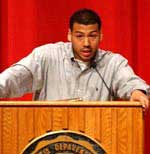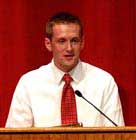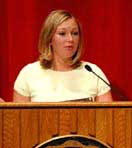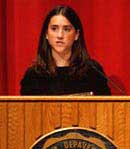DePauw's New Community Covenant Drafted
June 2, 2004
Visit Coalition for Building a Responsible Community Web Site; Read the Community Covenant
 June 2, 2004, Greencastle, Ind. - “With your help and input throughout the past year, we have developed a statement of community principles that all of us can embrace," says Paul Booth, a 2004 DePauw University graduate, describing the work of the task force that drafted a new Community Covenant for DePauw. "In essence, the covenant is the epitome of who we are; it is an acknowledgement of the past, present and future accomplishments of those who embody the DePauw community.” Read the covenant by clicking here.
June 2, 2004, Greencastle, Ind. - “With your help and input throughout the past year, we have developed a statement of community principles that all of us can embrace," says Paul Booth, a 2004 DePauw University graduate, describing the work of the task force that drafted a new Community Covenant for DePauw. "In essence, the covenant is the epitome of who we are; it is an acknowledgement of the past, present and future accomplishments of those who embody the DePauw community.” Read the covenant by clicking here.
The covenant is a key component of the Coalition for a Responsible Community, an effort that involved all DePauw constituents -- students, faculty, alumni and administrators -- that was launched in March 2003 to address alcohol abuse and related at-risk behaviors (read more here). Before the 2004 academic year ended, the campus community gathered for a May 4 convocation in Kresge Auditorium not only to hear progress made by the Coalition, but also -- in the words of Paul Booth -- “to celebrate the foundation of the newest DePauw tradition, the covenant.”
 The covenant is a statement of principles about what kind of community DePauw should be. “What was once an administrative vision has now been transformed into an initiative led by students," Booth noted. Another member of the Covenant Task Force, sophomore Zachary W. Adams (photo at right), explained that input was secured from students in all living units, including all Greek chapters and residence halls.
The covenant is a statement of principles about what kind of community DePauw should be. “What was once an administrative vision has now been transformed into an initiative led by students," Booth noted. Another member of the Covenant Task Force, sophomore Zachary W. Adams (photo at right), explained that input was secured from students in all living units, including all Greek chapters and residence halls.
Student leaders listed four steps planned to implement the covenant, including:
- First-year students as well as upperclass students will be asked to sign the covenant at the opening convocation in August.
- Faculty and staff members also will be asked to sign the covenant. And alumni who attend campus events, such as Alumni Reunion Weekend and Old Gold Weekend, will be invited to sign the covenant.
- The covenant will be posted in public places on campus, including residence halls.
- The covenant will be incorporated into student services programming for first-year student, residence life and other programs.
 At the convocation, a member of the Greek Relations Task Force, senior Megan E. Casey (photo at left), announced the development of a Greek Relationship Statement, a “two-part document that establishes expectations for not only the Greek chapters but the University as well.” The statement covers seven categories: academics, citizenship and community involvement, member development, housing national organization relationships and alumni/adviser support. Casey noted that, while the majority of the expectations included for Greek chapters is not new, most of the expectations for the University are new. She says DePauw will:
At the convocation, a member of the Greek Relations Task Force, senior Megan E. Casey (photo at left), announced the development of a Greek Relationship Statement, a “two-part document that establishes expectations for not only the Greek chapters but the University as well.” The statement covers seven categories: academics, citizenship and community involvement, member development, housing national organization relationships and alumni/adviser support. Casey noted that, while the majority of the expectations included for Greek chapters is not new, most of the expectations for the University are new. She says DePauw will:
- Provide and train faculty advisers.
- Provide leadership seminars for Greek members.
- Hold a formal public ceremony in the fall to recognize the chapters that are doing well on campus.
Casey indicated that the statement serves as a signed agreement between the Greek chapters and the University. “The University will be able to provide support and assistance and help chapters rather than always being seen as the punitive body,” Casey said. “This demonstrates that the University does realize the positive impact chapters have on this campus, and so this Relationship  Statement shows the University's desire to preserve this legacy.”
Statement shows the University's desire to preserve this legacy.”
The Leadership Task Force identified additional needs for leadership training on campus. “We excel in leadership on this campus and have many great programs available for students to learn about leadership,” senior Patricia J. Cooksey (photo at right), a task force member, said. “But we found two areas where we felt there was a need for more extensive and effective training –- the first being for sophomore students, and the second for our core leaders on this campus who have a leadership position.”
Cooksey said that two student groups have formed to develop the leadership training. One student-led initiative is the sophomore experience, which will be a series of workshops and other programs designed to continue leadership development and support that builds upon programs  provided during students' first year on campus. The second leadership initiative is to provide further training and support for student leaders in order to help them deal with problems and challenges and promote a common set of values. “We feel that [the leadership training programs] will meet the needs of our students and help to create leaders who are aware of our community and of themselves,” said Cooksey, recipient of the 2004 Walker Cup as the outstanding senior student (read more here). “It has been great over the past year to see students on this task force take ownership in setting the new direction for leadership development on this campus.”
provided during students' first year on campus. The second leadership initiative is to provide further training and support for student leaders in order to help them deal with problems and challenges and promote a common set of values. “We feel that [the leadership training programs] will meet the needs of our students and help to create leaders who are aware of our community and of themselves,” said Cooksey, recipient of the 2004 Walker Cup as the outstanding senior student (read more here). “It has been great over the past year to see students on this task force take ownership in setting the new direction for leadership development on this campus.”
Learn more about the Coalition for Building a Responsible Community by clicking here.
